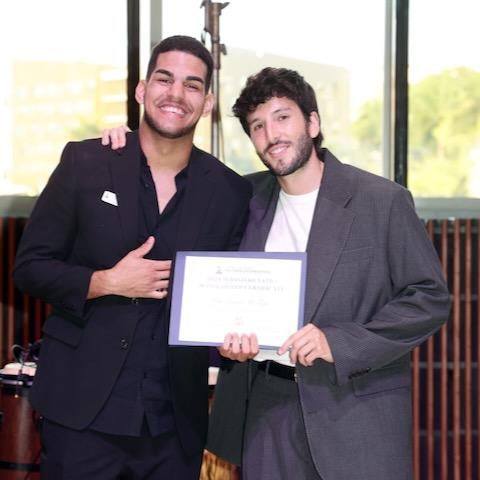What Does Science Sound Like?

David Ibbett
Image by Raja Palanimurugan
What does scientific data feel like?
The composer David Ibbett helps answer that question. "The thing that boggles the mind is that we take it for granted. You know, we are not constantly amazed," says Ibbett, who heads up the Multiverse Concert Series and teaches across several departments at Berklee, including Composition and Liberal Arts and Sciences. Combining orchestral and electronic elements, his compositions unlock the surprising layers of drama, foreboding, and hope hidden within the charts and figures that describe some of humanity's most significant discoveries. They bring a sense of wonder to the age of stunning scientific advancement we're living through.
On this episode of our podcast, Sounds of Berklee, we dig into the process of turning science into sound through a technique called "sonification" (think visualization, but with sound instead of images), and of finding artistic inspiration within other disciplines. Listen to the conversation and check out an excerpt from the interview transcript (edited for length and clarity) below.
Find us on Spotify and Apple Podcasts, or listen on SoundCloud:

David Ibbett conducts his 'Black Hole Symphony' at the Boston Museum of Science.
Image by Raja Palanimurugan
John Mirisola: Take me back to that moment when you started figuring out, okay, I have this, this deep interest in science. I have, obviously, a deep interest in music.... How did you arrive at the conclusion that you could make a tone poem about one of the moons of Jupiter [Europa]—you could bring these two loves together in a way that perhaps no one's really done in the same way?
David Ibbett: Well, I think all composers have to look outwards, and find something, that is captivating, beautiful, but also something mysterious that we want to understand more. My teacher back at Cambridge always said that to me: Every composer's got their passion. And then they spend their life trying to bring that into music. And it's difficult....
For me, the science has always been a source of hope. Just looking at what has happened in my own lifetime, you know, we've had the first discovery of an exoplanet, a planet round another star. When I was born, we didn't know if there were any. Now we know there's 5,000 and counting. You know, the Human Genome Project; amazing advances in computing...
The thing that boggles the mind is that we take it for granted. You know, we are not constantly amazed. We just sort of go, "Okay, we've got some new technology. Great." It is moving at such a pace, and we have this human ability to adapt really quickly to a new normal. But there's nothing normal about it. This is this incredible age of discovery. And I think music and art can open that up, and make us more curious, more reflective, and hopefully more grateful as well.
It was just so rich, the Europa story, when we just started thinking, you know, a flute can sound like a rocket.... The flute is just this great sort of pantomime instrument. You can make all these different mouth sounds and you can control the tone so much. So, you know, we could tell the whole story of this journey just with the embouchure of the flute. And then electronic sound that you layer it up, so you can have all these sounds together. The joy of that one piece really has spawned hundreds of pieces I've done since then.
Episode Credits
Produced by John Mirisola
Production assistance by Bryan Parys
Theme music by Sleeping Lion
Media excerpted:
- Black Hole Symphony (David Ibbett/Multiverse Concert Series)
- "Water Romanza" and "Romanza Acoustic" from Octave of Light (David Ibbett/Multiverse Concert Series, feat. Beth Sterling and Amelia Sie)
- "The Sound of Two Black Holes Colliding" (LIGO Observatory/Caltech/MIT)
Learn more about the Climate Hope Concert, which premieres on Earth Day (April 22) at WBUR's CitySpace. Virtual and in-person tickets are available.
Enjoy the show? Have thoughts or questions for the Sounds of Berklee team? Let us know at soundspodcast@berklee.edu.




